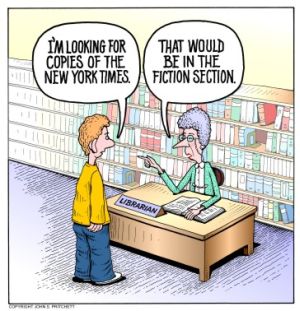
"I think there's a much greater problem than political bias. I see political bias both ways. I don't tend to see as much of it as some people do. To me, the two main biases that affect television news are a bias toward simplicity - stripping a story of its necessary nuance - and toward sensationalism, making a story that really isn't that important seem as if it is. Those are the two primary and most deleterious biases operating in television news today."
-Eric Burns of Fox News Channel's "Fox News Watch"
Aside from Burns' often less-than-fair-and-balanced employer (and underdeveloped response above from a Desert Sun interview), he's made a great point about the state of the media today: it's a terrible hybrid of dry, bias-fearing news stories and yellowed, bias-loving reports. Just as the press is attacked for increased partisanship in its pages and broadcasts, its expressive and creative nature is also under restraint from the political correctness police.
Where to go from here?
Most reporters, no matter who they are working for, strive to do the best report they can - after all, it's their job. And ideally, of course, a news story contains no bias - that's supposed to be left for (occasionally) features and definitely opinion. But as every journalist knows, minimizing bias is the best you can do, since bias appears from the first source you interview and even how you heard about the story in the first place. It's an accepted hazard.
But it's a growing trend that the press has either grown so weary of accusations (even legal ones) that the story itself suffers, or has simply thrown caution to the wind and produced a piece that makes no attempt at being ideal/moral/whatever-you'd-aspire-it-to-be journalism at all, even bordering on advocacy journalism. These fights and flows are equally as damaging.
In today's media climate, it can't be the public's fault, or even the government's. Each journalist, be it writer, editor or publisher, harbors his/her own regulatory agency within. It's their job to put their foot down and keep the craft on track - even if it means publicly denying a presidential request.
Maybe this won't happen before the next administration or cultural shift - when the overused terms "liberal media" and "media bias" have the chance to become less buzzworthy - but that doesn't mean journalists shouldn't listen to themselves. It's part of the invisible pact you make with your readers when you become a journalist.
What do you think of the state of the press today?


![Editorialiste [at] gmail](https://blogger.googleusercontent.com/img/b/R29vZ2xl/AVvXsEjzDvlHqUd5msfCmRq2Q5EZRpn_nbVg33bjiUhLEigM_5fudZhIHvuAVxB4_MS0xn-cQ0EKyjxOua1ysQ4NdMzyvhg1oSVTv6OJAarhVTqG0BBkJKTjqBhwMjrMGOANWxT8l8rKFg/s220/editorialiste_logo.jpg)
1 comment:
Post a Comment